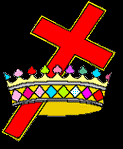Royal Black Institution
The Royal Black Institution, the Imperial Grand Black Chapter Of The British Commonwealth, or simply the Black Institution,[1] is a Protestant fraternal society.
Logo of the Royal Black Institution | |
| Formation | 1797 |
|---|---|
| Headquarters | Lurgan, County Armagh Areas found: United Kingdom (based mainly in Northern Ireland and Scotland), Republic of Ireland (almost exclusively in County Donegal), United States, Canada, Australia, New Zealand other Commonwealth countries |
| Rev. William Anderson | |
Imperial Grand Registrar | Mr. William Scott |
| Website | royalblack |

History
The Royal Black Institution was formed in Ireland in 1797, two years after the formation of the Orange Order in Daniel Winter's cottage, Loughgall, County Armagh, Ireland.
The society is formed from Orangemen and can be seen as a progression of that Order although they are separate institutions. Anyone wishing to be admitted to the Royal Black Institution must first become a member of an Orange Order Lodge, and many are members of both.
The Royal Black is often referred to as "the senior of the loyal orders".
Members wear a sash or collarette of which the predominant colour is black.
Organisation and events
Its headquarters are in Loughgall, County Armagh. Members refer to each other as "Sir Knight", whereas in the Orange Order members are referred to as "Brother" or "Brethren". The RBI claim that their basis is the promotion of scripture and the principles of the Protestant Reformation. However, this is contested by people who suggest that the rituals are not biblical.[2] It has preceptories throughout the world, mainly in the major English speaking countries, and is particularly strong in Newfoundland.
In 1931 the IRA occupied Cootehill in County Cavan, on the day before a planned demonstration by members of the Royal Black Institution.[3]
In Northern Ireland it holds an annual parade in the village of Scarva, County Down, on 13 July (the day after the Orange Order's 12 July celebrations). It is commonly referred to as "The Sham Fight" as it involves a mock fight between actors reenacting the Battle of the Boyne. The other major parade of the year is "Black Saturday", also known as "Last Saturday", held on the last Saturday in August at several locations throughout Ulster (including a major parade in Raphoe in the Laggan district of East Donegal, Ireland).
The society is also popular in Scotland, where 60 preceptories exist organised into 11 districts across the country.[4] Twenty-six marches by the Black Institution have taken place in Glasgow alone between 2009 and 2010.[1]
2012 apology
The Royal Black Institution has adopted a more conciliatory attitude to contentious parades than the Orange Order, and is less overtly political, though not without political influence.
After loyalist bands defied a Parades Commission ruling on Black Saturday by playing music outside St Patrick's Catholic Church on Donegall Street, Belfast, the Royal Black Institution issued an apology to the clergy and parishioners of the church for any offence caused. The parish priest, Father Michael Sheehan, welcomed the apology and "the sincere Christian spirit behind it".[5]
Degrees
The society's members are assigned one of eleven degrees, as follows, in descending order:
- Royal Black Degree
- Royal Scarlet Degree
- Royal Mark Degree
- Apron and Royal Blue Degree
- Royal White Degree
- Royal Green Degree
- Gold Degree
- Star and Garter Degree
- Crimson Arrow Degree
- Link and Chain Degree
- Red Cross Degree
The Institution also possesses a final retrospective overview degree, which is essentially an overview of the eleven.
Sovereign Grand Masters
A chronological list of Sovereign Grand Masters of the Royal Black Preceptory:
- 1846: Thomas Irwin
- 1849: Morris Knox
- 1850: Thomas Johnston
- 1857: William Johnston
- 1902: H. W. Chambers
- 1914: William Henry Holmes Lyons
- 1924: Lt. Col. Sir William James Allen
- 1948: Sir Norman Stronge, 8th Baronet
- 1971: Jim Molyneaux
- 1995: William J Logan
- 2008: Millar Farr
- 2018: Rev. William Anderson
See also
- Orange Order
- The Troubles
Notes and references
- "Orange Parades to be limited in Glasgow City Centre", BBC News, 9 December 2010
- E.g. by W. P. Malcomson, in "An Evangelical View of Freemasony and the Loyal Orders", The Evangelical Truth website
- http://www.historyireland.com/20th-century-contemporary-history/southern-orange-commemorations-past-and-present/
- Locations of The Royal Black Institution Archived 28 September 2010 at the Wayback Machine, Royal Black website
- "Royal Black Institution apology to St Patrick's church over march", BBC News, 6 September 2012